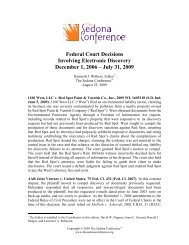Chambers Handbook for Judges - Federal Judicial Center
Chambers Handbook for Judges - Federal Judicial Center
Chambers Handbook for Judges - Federal Judicial Center
You also want an ePaper? Increase the reach of your titles
YUMPU automatically turns print PDFs into web optimized ePapers that Google loves.
tain restrictions, the stricter proscriptions of the Ethics Re<strong>for</strong>m Act govern.<br />
Because the Conference has delegated its administrative authority<br />
over Supreme Court employees under the Ethics Re<strong>for</strong>m Act to the<br />
Chief Justice, be<strong>for</strong>e accepting honoraria, Supreme Court law clerks<br />
and secretaries should look to Court regulations <strong>for</strong> guidance.<br />
F. Gifts<br />
The Ethics Re<strong>for</strong>m Act of 1989 proscribes the giving, solicitation, or<br />
acceptance of certain gifts by judicial branch officers and employees.<br />
See 5 U.S.C. §§ 7351, 7353. For example, a law clerk or secretary may<br />
not accept a gift in return <strong>for</strong> being influenced in the per<strong>for</strong>mance of<br />
any official act. 5 U.S.C. § 7353(b)(2)(B). Section C(2) of Canon 5 of the<br />
Code of Conduct <strong>for</strong> Law Clerks also restricts the types of gifts any law<br />
clerk may accept. The <strong>Judicial</strong> Conference has issued a set of regulations<br />
entitled Regulations of the <strong>Judicial</strong> Conference of the United States<br />
Under Title III of the Ethics Re<strong>for</strong>m Act of 1989 Concerning Gifts to administer<br />
the Act.<br />
Again, because the Conference has delegated its administrative authority<br />
over Supreme Court employees under the Ethics Re<strong>for</strong>m Act to<br />
the Chief Justice, Supreme Court law clerks and secretaries should become<br />
familiar with regulations promulgated by the Chief Justice concerning<br />
gifts.<br />
G. Political Activity<br />
A September 1943 <strong>Judicial</strong> Conference resolution states that judicial<br />
branch employees should not participate in the kind of political activity<br />
<strong>for</strong>bidden to executive branch employees by the Hatch Political<br />
Activity Act as codified in Titles 5 and 18 of the U.S. Code. In general<br />
terms, the act prohibits federal government employees from actively<br />
participating in political campaigns in partisan elections. In 1993, Congress<br />
eased some of the Hatch Act restrictions, but, like the original act,<br />
these amendments do not apply officially to judicial branch employees.<br />
Under the Hatch Act, government employees may express their<br />
views, wear candidates’ buttons, contribute to campaigns, and belong<br />
12 <strong>Chambers</strong> <strong>Handbook</strong> <strong>for</strong> <strong>Judges</strong>’ Law Clerks and Secretaries

















